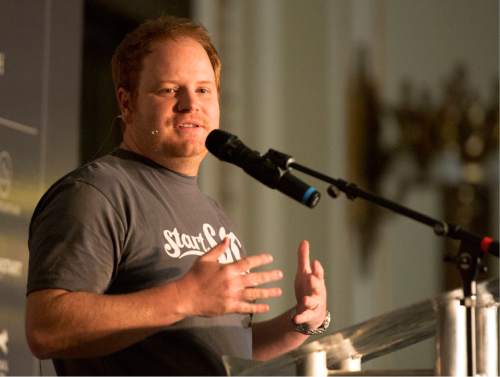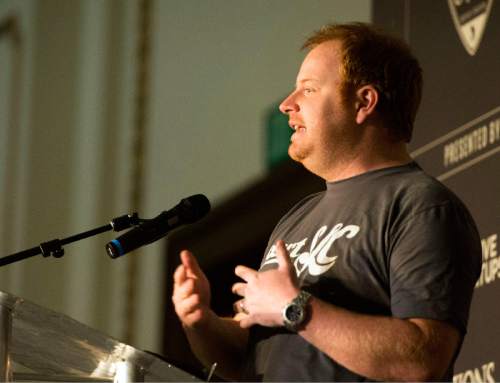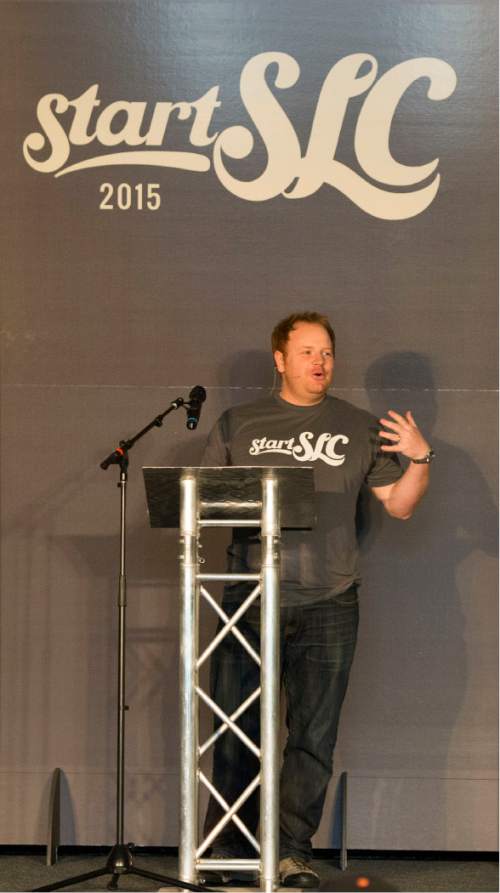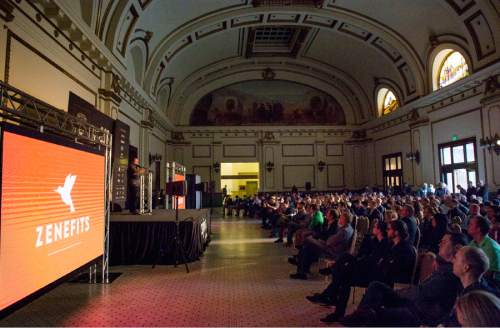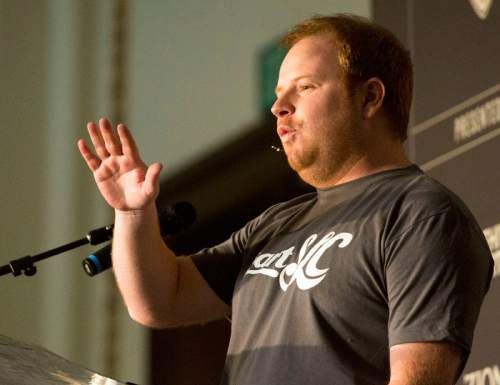This is an archived article that was published on sltrib.com in 2015, and information in the article may be outdated. It is provided only for personal research purposes and may not be reprinted.
The crowd of mostly 20- and 30-year-old tech savvys alternatively booed and cheered Friday at the startSLC festival as the CEO of rocketing startup Zenefits told of his travails with state regulators.
But, he said, there's also a possible solution before the Utah Legislature.
The crowd attending the startSLC festival with ideas for new companies illustrated the image problem Utah's government has created in telling the California-based Zenefits that it is operating in Utah illegally. State insurance regulators have said that under state law, Zenefits can't provide free software to small- and medium-sized companies to manage human resources tasks while also offering to sell them health insurance.
Zenefits CEO Parker Conrad has accused the Utah Insurance Department of acting to protect existing insurance brokers' business because they have a hard time competing with his new tech-based business model. And on Friday, Conrad said that while Utah touts a thriving high-tech sector, it "can't have it both ways.
"You can't embrace the tech industry only when they don't change things or only when they don't do something that pisses off an incumbent [industry]," he told a festival audience of several hundred people.
The issue is important for other startups as well as Zenefits, he said.
"I guarantee that every single one of you in your audience as your companies grow and become successful, you will start to tread on the toes of incumbents in your specific area," Conrad said. "So the question is, how are we as a society and how are we as the state of Utah going to react in those specific cases?"
Utah Insurance Commissioner Todd Kiser sent the San Francisco company a letter in November warning it could be ordered to cease operations and fined nearly $100,000 for violating Utah laws that prohibit insurance brokers from providing free or below-market products or services to users of its software in order to keep competition level.
Zenefits said Utah is the only state that has acted to curtail its activities.
The company contends it operates legally here because none of its software clients is required to purchase other services through it.
Zenefits' software allows companies free use of its software, which automates many tasks related to employees, including payroll and benefits. It offers insurance and other services through the platform and earns commissions or fees if companies buy.
A possible solution is before the Utah Legislature, but its passage is uncertain.
Rep. John Knotwell has proposed HB141, which he said aims to make clear that an insurance broker can offer free or below-market services, as long as there is no obligation to also buy insurance.
The Herriman Republican said Friday he got interested in the issue because of the "Twitter explosion" that followed the finding by Kiser. He says the "crux of the issue" is the state's reputation for being business-friendly with a thriving high-tech sector.
"We are growing our economy by being a hub of innovation, being a hub of technology," Knotwell said. "We're the No. 1 state in the country to do business, then we get this."
Gov. Gary Herbert's office declined comment on Knotwell's bill, pointing instead to the governor's earlier statement on the Zenefits dispute.
In mid-December, Herbert said he was "willing to work with all stakeholders to ensure Utah has the right policy in place to embrace innovative ideas while protecting consumers."
Kiser's office also declined comment on the bill.
Knotwell said he already was getting pushback from insurance brokers on the current language of the bill.
"This is something the brokers are not happy with," he said. "But that's why we have the political process. We're going to work through it."
Knotwell said he hopes to win the support of Rep. Jim Dunnigan, R-Taylorsville, an insurance broker. Dunnigan did not return an email seeking comment on the bill.
Conrad said in an interview that the dispute already has cost Utah some jobs. Because of skyrocketing growth, the company decided to open a new office within a two-hour plane ride from its San Francisco headquarters. He first considered Utah, where he has skied since he was a kid.
"The plan was that we were going to do all that in Salt Lake City," Conrad said. "And then this sort of stuff came up...and that's when we ended up going to Phoenix and opening our office there."


